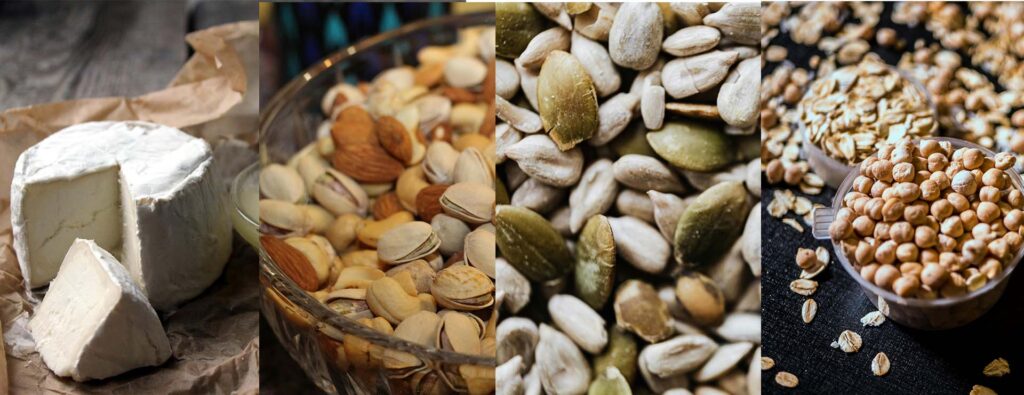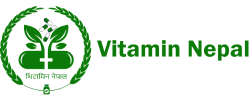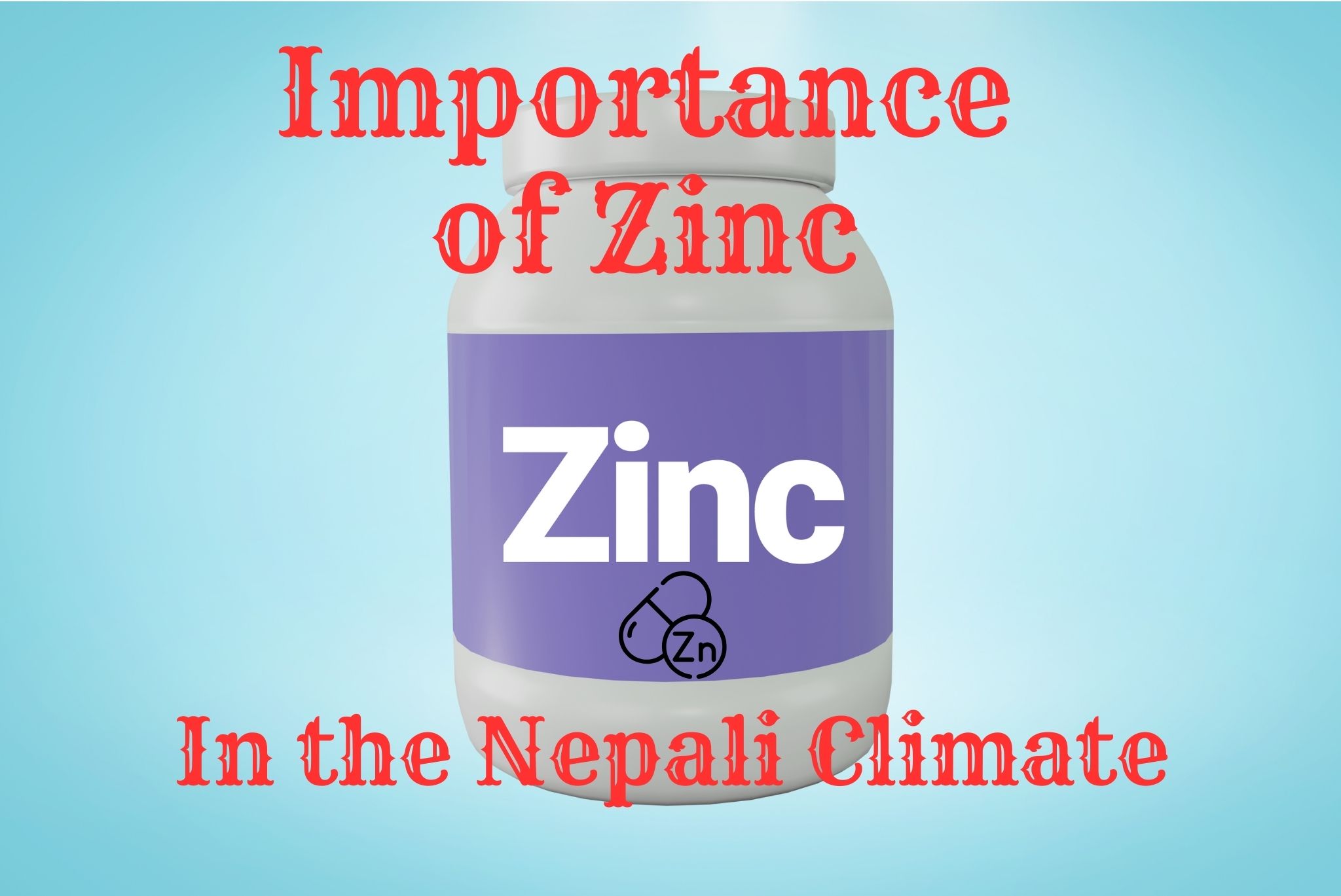Introduction

Zinc is a mineral that plays a very important role in maintaining a healthy immune system, cell function, wound healing, and also protecting the body against infections. Here in Nepal, there is a wide range of climatic conditions.
From winter to hot and humid monsoons, having a strong and adaptable immune system is very important. Changes in weather bring risks of seasonal illnesses. Here comes the important role of this mineral because it contains immune-boosting properties. The availability of this mineral in many foods and supplements makes it a valuable nutrient to consider for better health in Nepal’s varied climate
Why Zinc is Important for Immune Health
A healthy immune system means the ability to fight various seasonal illnesses and infections. It also plays a very important role in activating immune cells like T-cells that detect and eliminate disease-causing viruses like pathogens. Its deficiency can compromise the immune response. This can make you more unsafe for infections like colds, and flu, as well as respiratory issues. That is common during colder seasons.
During the colder season, having a strong immune system helps to fight off illnesses. This is where this mineral steps in. Additionally, it is known for shortening the duration of colds by helping the immune system function more effectively. Similarly, some studies show that those who maintain healthy zinc levels have strong resistance to colds and other illnesses.
Seasonal Illnesses in Nepal

Nepal’s climate changes across the seasons. Every season brings challenges to health. Here is how zinc can make a difference during seasons:
Winter Season (December – February)
In the winter season, the temperature becomes colder which increases the chance of having flu and the common cold. This low temperature can cause weakness in immune defenses. This makes people more vulnerable to viruses. For this having zinc-rich foods and supplements can help to improve immunity and maximize the impacts of winter illnesses.
Monsoon Season (June – September)
In the monsoon season, there is high humidity and frequent rainfall. Due to the frequent rainfall, there are bacteria and viruses in the environment that multiply quickly. In this season people with weak immune might caught by viral infections, stomach issues, and other seasonal diseases. It can help to improve the body’s defense mechanism against these diseases. Likewise, it enables the immune system to handle those challenges brought by monsoon.
How Much Zinc Do You Need?
Understanding the recommended intake of this supplement is important to achieve maximum immune support. The recommended dietary allowance (RDA) for this mineral varies by age and gender:
Adult Men: 11 mg per day
Adult Women: 8 mg per day
Pregnant Women: 11 mg per day
Children (4–8 years): 5 mg per day
Our body needs only a small amount of zinc. It is very important to ensure that you are meeting your daily needs to maintain a strong immune. Excessive intake especially from supplements can cause adverse effects in our body. So it is best to consult a healthcare provider before taking any supplements.
Best Zinc-Rich Foods in Nepal
For people who are aiming for their zinc requirements through a diet then there are several foods available in Nepal that provide a good amount of this mineral. Here are some rich foods commonly found in Nepal:
Lentils and Chickpeas: These popular beans are a great vegetarian source and are frequently used in Nepali cooking.
Meat (especially mutton and chicken): Animal products are typically higher in zinc, making them excellent sources for non-vegetarians.

Seeds (Pumpkin, Sunflower): A rich source and they’re easy to incorporate into snacks and meals.
Nuts (Almonds, Cashews): Nuts are packed with healthy fats and are an accessible source of zinc.
Dairy Products (Milk, Yogurt): These are valuable sources of zinc and calcium, and are consumed in Nepal as part of traditional meals.

Having these zinc-rich foods in your daily diet can support your immune health for a long. Traditional Nepali dishes like daal and curries might be even healthier by including zinc-rich foods like chickpeas or meat.
Zinc Supplements: Should You Consider Them?
It is always best to meet nutrient requirements through diet. Supplements can be useful for those who are not getting enough of this mineral from food alone. Tablets are also sold in the market with different names like zinc sulfate, oxide, and chloride supplements. For women especially during periods, it can be very beneficial for them to support immune needs.
Sulfate and oxide are the most common forms used in supplements. Zinc chloride and oxide can be found in products like multivitamins. It is very important to choose a high-quality supplement and stick to the recommended dosage to avoid side effects. You can buy this mineral supplement in healthcare stores and online stores including Vitamin Nepal. At Vitamin Nepal, we sell supplements from reputed brands at the best price possible. You can have a look.
-
 Puritan’s Pride Zinc 50mg 100 Tablets₨2,500.00
Puritan’s Pride Zinc 50mg 100 Tablets₨2,500.00
Zinc Deficiency in Nepal: Signs and Prevention




Zinc deficiency is common in people where access to zinc-rich foods is limited or where diets are low in animal products. In Nepal, the common signs of this mineral deficiency may include:
– Frequent colds or infections
– Slow wound healing
– Hair loss
– Fatigue and weakness
A zinc deficiency may lead to a weak immune system, making the body more vulnerable to infections. By eating a balanced diet that includes both plant-based and animal-based sources or using supplements, when necessary, you can effectively prevent deficiency.
Tips for Boosting Immunity with Zinc in Nepal
Maintaining a healthy immune system is important but mostly during seasons when illness is common. Here are some tips according to my research to keep your level up and boost immune in Nepal’s Climate:
1. Include a variety of zinc-rich foods in your diet, such as legumes, meats, seeds, nuts, and dairy.
2. Consider zinc supplements during seasonal changes or when facing potential deficiency symptoms.
3. Check your daily dosage and avoid excessive intake. While it is important, too much can lead to issues.
4. Consult a healthcare provider if you are not sure about starting a supplement.
FAQs (Frequently Asked Questions):
Why is zinc important for immunity?
It supports immune cell function and helps fight infections, making it essential for strong immunity.
Which zinc-rich foods are available in Nepal?
Foods like lentils, chickpeas, pumpkin seeds, meat, and dairy products are excellent sources.
Who should consider zinc supplements?
Those with low levels, pregnant women, vegetarians, and older adults may benefit from supplements (after consulting a doctor).
What are the side effects of taking too much zinc?
High doses can cause nausea and stomach cramps, so it’s best to stick to recommended amounts.
Conclusion
In conclusion, this mineral plays an important role in our body to support and maintain a healthy immune system. Especially in Nepal where climate challenges are frequent, maintaining these mineral levels through diet or supplements can be a better way to support immune health. Always remember a balanced diet and proper supplementation can help you to stay healthy throughout the year.
Combine Multivitamin supplements with this mineral for enhanced Immune health, and overall well-being. Explore more about multivitamin supplements here on –> Multivitamins in Nepal.
To fill your nutritional gaps, you might want to explore Vitamin and Mineral Supplements in Nepal for a complete health boost.
You can order directly by calling us.
📞Contact: 9801205255, 9847396489
Or


